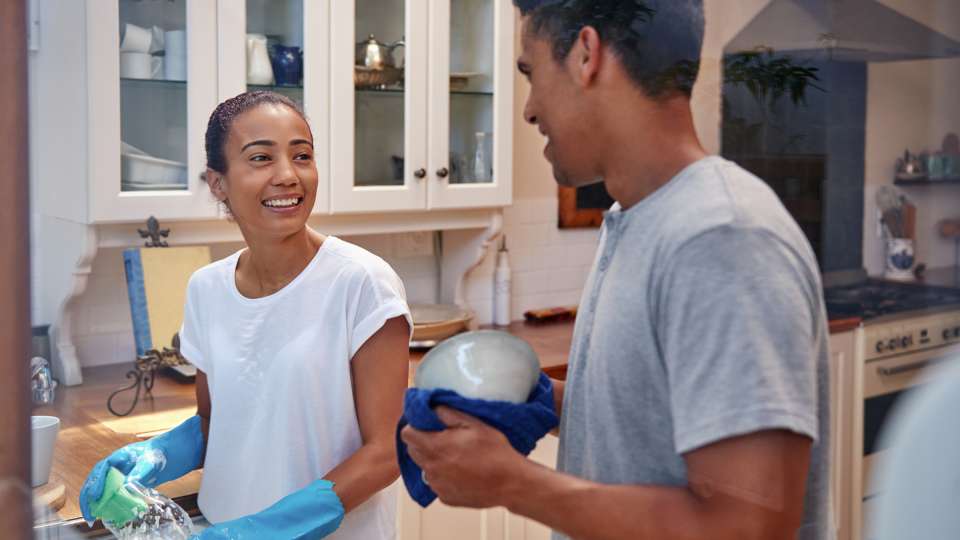This Is How Often You Should Clean Things, According to a Microbiologist

Ah, spring. The cherry blossoms. The longer days. The warmer-weather hiking. The…germs?
If you hunkered down over the winter and are just now reemerging into the world, you may have noticed that your house, apartment or condo could use a little sprucing. Spring is the perfect time for cleaning, after all. But cleaning isn’t as straightforward as it seems. Are certain cleaning methods more effective? How often should you clean things like sheets and towels?
There is no one-size-fits-all approach to spring cleaning, says Marilyn C. Roberts, Ph.D., a microbiologist and professor in the UW Department of Environmental & Occupational Health Sciences.
If you live with other people, particularly children, you’ll want to clean and wash personal items more often than someone who lives alone. Same if you or someone you live with is immunocompromised or has a skin condition like eczema.
The best way to prevent this from happening, of course, is to clean regularly and well. This applies to both you—washing your hands regularly is important—and your home. To help energize you for spring cleaning (unless you’re one of those people who actually likes to clean, in which case, more power to you) here are Roberts’ tips for often you should wash or replace things in order to keep germs at bay.
Sheets and pillowcases
Washing bedding once a week is a good habit to adopt. To make this more achievable, buy an extra set or two. And if you let a pet sleep on your bed, you might want to consider cleaning your sheets more regularly or getting them their own bed. But, you ask, what about when Fluffy’s big, sad eyes make your heart break a little after you kick her off the bed? If she must sleep there, establish a better hygiene routine for her. Remember, the mud your dog rolled in or that mouse your cat caught are all joining you at bedtime. To counter this ickiness, bathe your pet if they get dirty, wipe their paws if they were outside and wipe their backside after they do their business.
Showers and tubs
If you like taking baths, clean your tub after each use to prevent soap scum buildup. Showers can be cleaned less often, but keep an eye out for mold. It’s especially common in the Pacific Northwest and if spotted should be dealt with right away. (And no: That slimy pink stuff encircling your shower drain isn’t mold, but bacteria, and it’s probably not that dangerous unless you have a weak immune system.) To prevent mold from growing, use your bathroom fan when you shower and wipe off excess water that builds up on any walls or shelves.
Towels
Cleaning your towels every week is fine—as long as you let them dry out between uses. Bacteria loves damp towels, so if you insist on crumpling your towel into a heap on your bathroom counter when you’re done with it, wash it after every two or three uses.
Kitchen and bathroom sponges
Food particles that hide out on damp sponges can breed bacteria, so make sure you wash sponges regularly in very hot soapy water, every week or more. The best way to prevent a bacteria infestation is to buy sponges you can throw in the dishwasher or washing machine.
Toilet bowl brushes
Even if you rinse off or clean your toilet brush after use, it probably still has fecal particles on it (gross). Instead, toss it out and opt for a disposable version.
Loofahs and body poufs
Just don’t go there. These items can’t be cleaned easily, so when you use them you’re basically scrubbing your body with bacteria, dead skin and possible mold particles.
Toothbrushes
Mechanical toothbrushes usually have an indicator for when you need to change the head. For regular toothbrushes, the three-month standard is usually fine, though if you brush your teeth multiple times a day you may want to change it more often. You should always buy a new toothbrush after you’ve had the flu or any kind of oral infection.
Dishes
If you’re someone who rinses your dishes, places them in the dishwasher and promptly forgets about them for a week, you aren’t alone. But any leftover food particles on dirty dishes are an invitation for bacteria. Try to wash your dishes every day or every other day, if possible, particularly if you hand wash your dishes. Dishwashers tend to reach temperatures hot enough to sterilize items and kill any bacteria living on them, but most of us would scald ourselves if we tried to hand wash using water that hot.
The takeaway
Roberts recognizes that many people won’t be as mindful of cleaning as she recommends—after all, she’s a microbiologist, which gives her a unique (and potentially disquieting) look into the world of the microbes living amongst us. So just do your best. And the most effective way to protect yourself from bacteria and viruses? Something simple that you probably aren’t doing enough.
“Washing your hands is really the first line of defense against infection,” Roberts says.

 Healthy ideas for your inbox
Healthy ideas for your inbox





